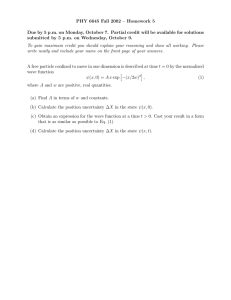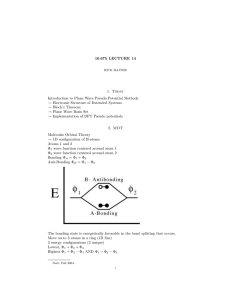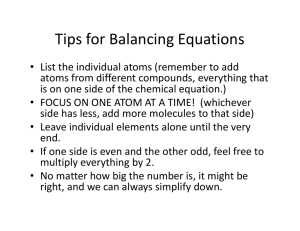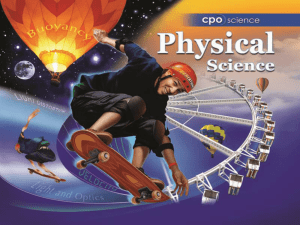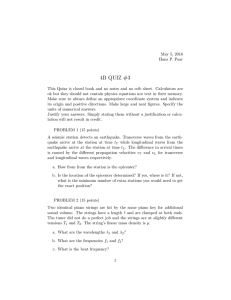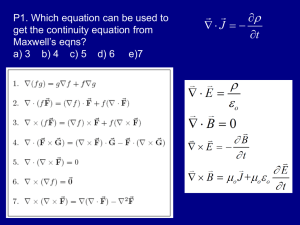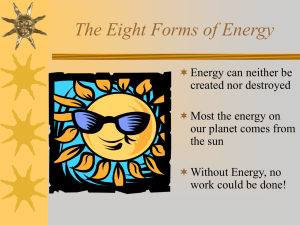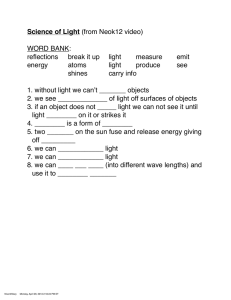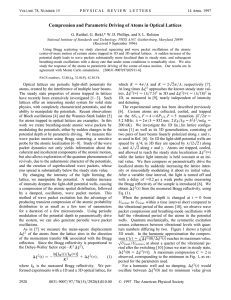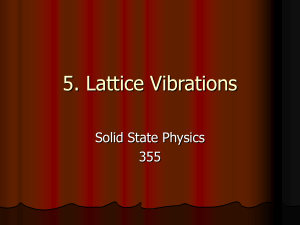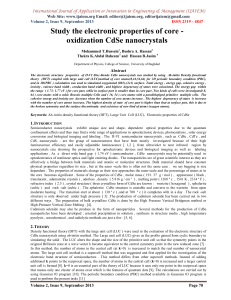Lecture 12
advertisement
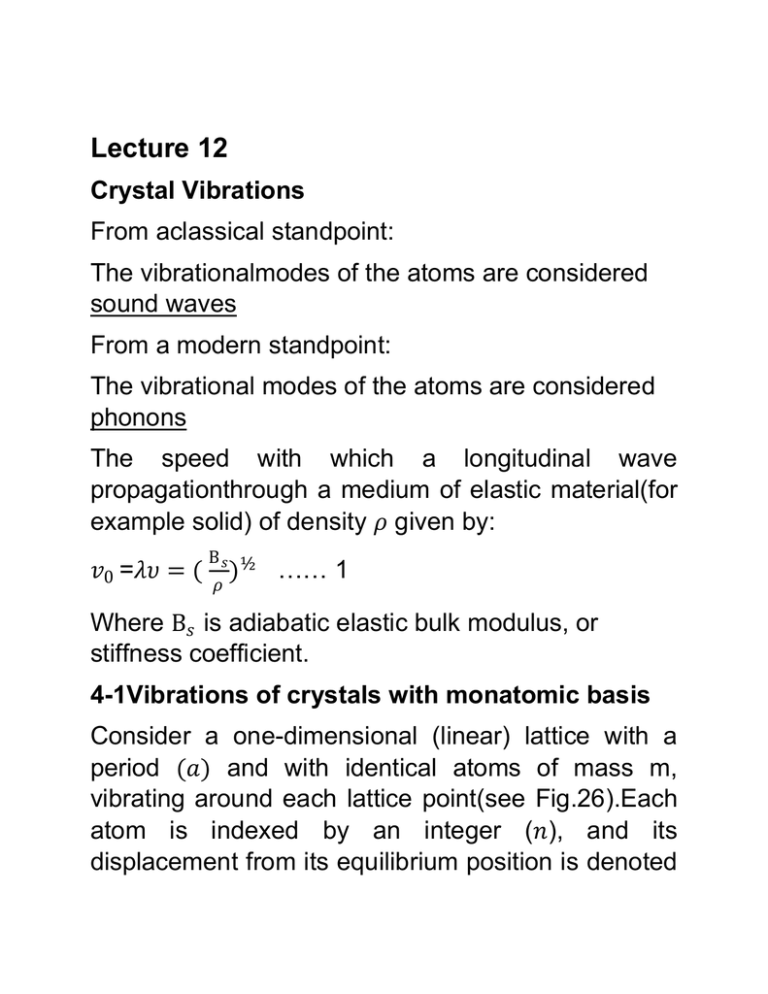
Lecture 12 Crystal Vibrations From aclassical standpoint: The vibrationalmodes of the atoms are considered sound waves From a modern standpoint: The vibrational modes of the atoms are considered phonons The speed with which a longitudinal wave propagationthrough a medium of elastic material(for example solid) of density 𝜌 given by: 𝑣0 =𝜆𝜐 = ( Β𝑠 ½ ) 𝜌 …… 1 Where Β𝑠 is adiabatic elastic bulk modulus, or stiffness coefficient. 4-1Vibrations of crystals with monatomic basis Consider a one-dimensional (linear) lattice with a period (𝑎) and with identical atoms of mass m, vibrating around each lattice point(see Fig.26).Each atom is indexed by an integer (𝑛), and its displacement from its equilibrium position is denoted (𝑢). The atoms are taken to oscillate in the same direction as the lattice. We want to find the angular frequency(w) of an elastic wave in terms of wavevector (k). In this one-dimension case we will take into account only the interaction between nearest neighbors. The force acted on the nth atom: 𝐹 n=𝑐[𝑢n+1+𝑢n-1-2𝑢n] In a homogeneous solid the transmission of a plane wave in the x-direction can be represented by the displacement equation: 𝑢=𝐴exp[i(𝑘𝑥 − 𝑤𝑡)],and𝑢n=𝐴exp[i(𝑘𝑛𝑎-𝑤𝑡)] where 𝑥 = 𝑛𝑎 𝑑2𝑢𝑛 𝑑𝑡 2 =-𝑤2 𝐴 exp[i(𝑘𝑛𝑎-𝑤𝑡)] , 𝑢n=-𝑤2𝑢𝑛 ∴ Fn=-m𝑤2𝑢𝑛 -m𝑤2𝑢𝑛 = C [𝑢n+1+ 𝑢n-1-2𝑢n] 𝑐 𝑢𝑛+1 𝑚 𝑢𝑛 𝑤2= [2- - 𝑢𝑛−1 𝑢𝑛 ] 𝑐 𝑐 𝑚 𝑚 𝑤2= [2-𝑒 𝑖𝑘𝑎 - 𝑒 −𝑖𝑘𝑎 ]= 2 [1- 𝑐𝑜𝑠𝑘𝑎] or 𝑐 𝑘𝑎 𝑚 2 = 4 sin2 ( ) 𝒄 𝒌𝒂 𝒎 𝟐 𝑾=±𝟐( )½ 𝒔𝒊𝒏 ( 𝑐 )=±𝒘m 𝒔𝒊𝒏 ( 𝒌𝒂 ) where 𝟐 ……………. 2 wm =±2( )½ 𝑚 This relation is called the phonon dispersion relationbetween w and k for allowed longitudinal wave in a linear monatomic chain, and is plotted in Fig. 27. Note: the plus and minus signs in Eq. 2 denote waves traveling either to the right or to the left. The motion in any point is periodic in time. k Fig. 27 2ndBrillouin zone2nd Brillouin zone k in the case of properties𝑘𝑎 ≪ 1(i.e. in the long wavelength limit ), 𝑠𝑖𝑛 ( 𝑘𝑎 2 )becomes ( 𝑘𝑎 2 ) and Eq. ( 2 ) becomes: 𝑤 ⋍ 𝑣0 𝑘 𝑐 𝑣0 = 𝑎( )½ …. 3 for 𝑘𝑎 ≪ 1(non-dispetion) 𝑚 𝑣0 :is the rapid spread of acoustic wave in a medium of elastic material, and It is approximately fixed amount 𝜋 In the case of properties𝑘 = ± (i.e. in the short 𝑎 wavelength limit, as𝑘 increases, the slope of 𝑤 decreases and becomes flat at the zone boundaries 𝜋 𝑘=± ). 𝑎 We have 𝑘 = 2𝜋 𝜆 ,then𝜆 = 2𝑎 , andwm =2 𝑣0 𝑎 phase and group velocities are in general given by: 𝑤 𝜗𝑝ℎ = 𝜕𝑤 𝜗𝑔 = 𝜕𝑘 𝑘 = 2 𝑘 ( 𝑐 ½ ) 𝑚 = 𝑣0 𝑐𝑜𝑠 ( 𝑘𝑎 2 𝑠𝑖𝑛 ( 𝑘𝑎 2 ) = 𝑣0 [ 𝑘𝑎 ) 2 𝑘𝑎 2 sin ( ] ) Note:in the case of 𝑘𝑎 ≪ 1 (or 𝜆 ≫ 𝑎) the atoms moving in one direction and the same phase and this explains the fact that𝑤 = 0 when 𝑘 = 𝑜. Problems 𝑐 1- Use Eq.𝑣0 = 𝑎( )½ to find the relation 𝑚 between 𝑐 and young model’s Y.? The answer (𝑐 = 𝑌𝑎). 2- in the case of properties 𝑘𝑎 ≪ 1, show that 𝜗𝑔 =𝑣0 , 𝜗𝑝ℎ =𝑣0 and 𝜗𝑔 =𝜗𝑝ℎ 𝜋 3- In the case of properties 𝑘 = ± , show that 𝑎 𝜗𝑔 =0 and 2𝑣0 𝜗𝑝ℎ = 𝜋
